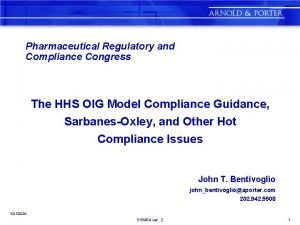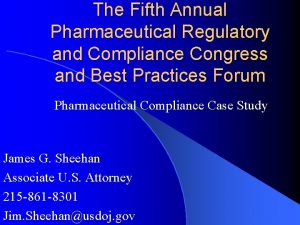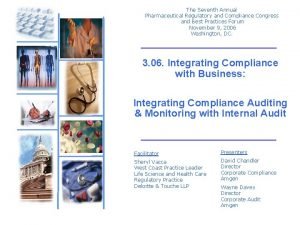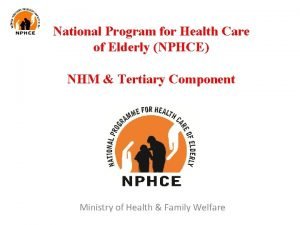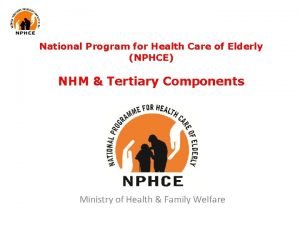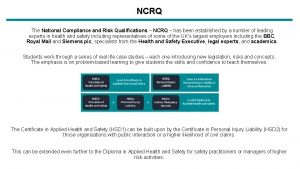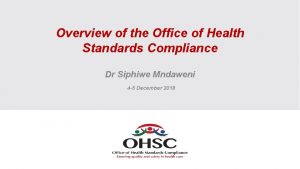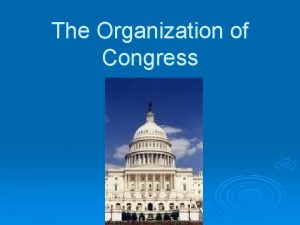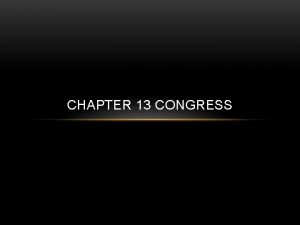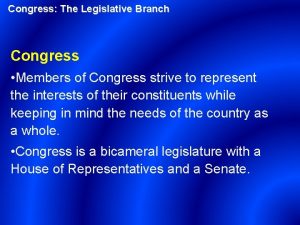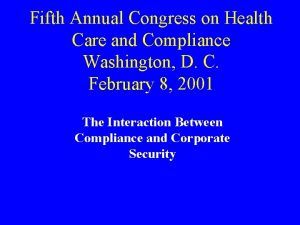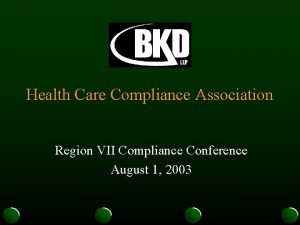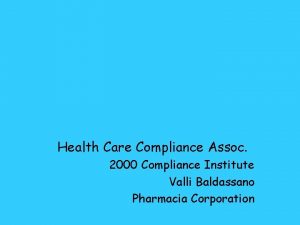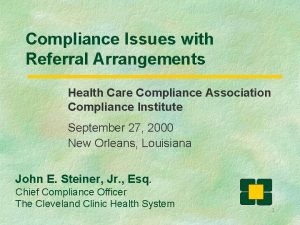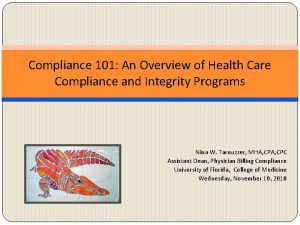National Congress on Health Care Compliance William R

















- Slides: 17

National Congress on Health Care Compliance William R. Braithwaite, MD, Ph. D Director, Healthcare Consulting Practice Washington, DC 7 February 2002, Washington, DC Pw. C © 2002 Pricewaterhouse. Coopers refers to the individual member firms of the world-wide Pricewaterhouse. Coopers organisation. All rights reserved.

Contents International Fair Information Practices HIPAA Privacy Requirements Scope Uses and Disclosures Consent vs. Authorization Minimum Necessary Rule State law & Preemption HIPAA Security Requirements How to get more information Pricewaterhouse. Coopers 2

5 Principles of Fair Info Practices Openness • Existence and purpose of record-keeping systems must be publicly known. Individual Participation • Individual right to see records and assure quality of information. – accurate, complete, and timely. Security • Reasonable safeguards for confidentiality, integrity, and availability of information. Accountability • Violations result in reasonable penalties and mitigation. Limits on Collection, Use, and Disclosure • Information is collected only with knowledge and consent of subject. • Information is used only in ways relevant to the purpose for which the data was collected. • Information is disclosed only with consent of subject or legal authority. 4 Pricewaterhouse. Coopers

Requirements for Privacy HIPAA requires: • Recommendations to Congress for legislation from the Secretary of Health and Human Services (done 9/97). • If legislation establishing privacy standards is not enacted within 3 years, the Secretary of HHS shall promulgate final regulations containing such standards. Final Rule published 12/28/2000 • Guidance issued 7/6/01. • Compliance required 4/14/2003. • Administrative Simplification Compliance Act (AKA ‘Delay’ legislation) – does not affect privacy scope or compliance date. • Modifications expected to be proposed early 2002. – Expect proposals to decrease administrative burden. – No change expected in compliance date. 5 Pricewaterhouse. Coopers

Scope: Who is Covered? Limited by HIPAA to covered entities: • Health care providers who transmit health information in electronic transactions. • Health plans. • Health care clearinghouses. Business associate relationships. . . • Agents and contractors (not otherwise covered) who need health information to do work on behalf of covered entities. • Covered entities required to contract for protection of the information. 6 Pricewaterhouse. Coopers

Scope: What is Covered? Protected health information (PHI) is: • Individually identifiable health information, • Transmitted or maintained in any form or medium (including oral), • Held by covered entities or their business associates. De-identified information is not covered. • Specific rules determine de-identification. 7 Pricewaterhouse. Coopers

Uses and Disclosures Limit to what is permitted in the Rule (4 conditions): • Treatment, payment, and health care operations (TPO). – Under conditions of notice and consent for direct providers. • Uses and disclosures involving the individual’s care or directory assistance, – Require an opportunity to agree or object. • For specific public purposes. – Following controls and limits in rule. • All others as permitted by individual. – Under written, revocable authorization. Specific requirements vary based on type of use or disclosure. 8 Pricewaterhouse. Coopers

Consent Written consent required before direct treatment provider may use PHI for TPO. Exceptions: • emergency treatment situation, • substantial communication barriers, • when required by law to treat. Not required for: • Indirect Treatment Providers, • Health Plans, • Health Care Clearinghouses. 9 Pricewaterhouse. Coopers

Policy Exceptions Covered entities may use or disclose PHI without a consent or authorization – only if certain conditions are met & the use or disclosure comes within one of the exceptions; • • • 10 As required by law. For health care oversight. For public health. For research. To facilitate organ transplants. For law enforcement. For judicial proceedings. For other specialized government functions. To Coroners, medical examiners, funeral directors. Pricewaterhouse. Coopers

Minimum Necessary Covered entities must make reasonable efforts to limit the use or disclosure of PHI to minimum amount necessary to accomplish their purpose. Exceptions: • • • 11 Disclosure to or request by provider for treatment. Disclosure to individual. Under authorization (unless requested by CE). Required for HIPAA standard transaction. Required for enforcement. Required by law. Pricewaterhouse. Coopers

Minimum Necessary (2) Reasonableness standard • consistent with best practices in use today. “Role-based” access limits. Standard protocols for routine & recurring uses / disclosures. Review each non-routine disclosure. May rely on judgment of requestor if: • • • 12 public official for permitted disclosure. covered entity. professional within covered entity. BA for provision of professional service for CE. researcher with IRB documentation. Pricewaterhouse. Coopers

State Law & Preemption State Health Information Privacy Laws are: • • Fragmented, not comprehensive Scattered in all parts of state law Entity specific (e. g. aimed at a specific type of healthcare entity) Not uniform or kept up-to-date HIPAA Administrative Simplification preempts most ‘contrary’ provisions of state law, • Except more stringent provisions of state law regarding privacy. Result: Each type of entity must perform (or have performed on its behalf) a legal analysis of the law in each applicable state with respect to HIPAA privacy rules to determine true requirements. • HHS not expected (or equipped) to do this. 13 Pricewaterhouse. Coopers

HIPAA Security Requirements Covered Entities shall maintain reasonable and appropriate administrative, technical, and physical safeguards - • to ensure integrity and confidentiality • to protect against reasonably anticipated – threats or hazards to security or integrity – unauthorized uses or disclosures • taking into account – technical capabilities – costs, training, value of audit trails – needs of small and rural providers Proposed rule published August 12, 1998. Final rule expected soon. 14 Pricewaterhouse. Coopers

Key Security Philosophy Identify & assess risks/threats to: • Availability • Integrity • Confidentiality Take reasonable steps to reduce risk. 15 Pricewaterhouse. Coopers

Security Issues Covers data at rest as well as transmitted data. Involves policies/procedures & contracts with business associates. • For most security technology to work, behavioral safeguards must also be established and enforced. – requires administration commitment and responsibility. Final rule expected soon: • Harmonized with privacy (scope, philosophy). • General requirements only (flexible, scalable, technology neutral). Electronic signatures: • Final rule will depend on industry progress on reaching consensus on a standard. 16 Pricewaterhouse. Coopers

For More Information OCR Privacy Website: http: //www. hhs. gov/ocr/hipaa/ Administrative Simplification Web Site: http: //aspe. hhs. gov/admnsimp/ Georgetown Health Privacy Project www. healthprivacy. org William. R. Braithwaite@us. pwcglobal. com 17 Pricewaterhouse. Coopers

Pwc
 Pharmaceutical compliance congress
Pharmaceutical compliance congress Oig pharma compliance guidance
Oig pharma compliance guidance Pharmaceutical compliance congress
Pharmaceutical compliance congress Pharmaceutical regulatory and compliance congress
Pharmaceutical regulatory and compliance congress Pharmaceutical regulatory and compliance congress
Pharmaceutical regulatory and compliance congress Pharmaceutical regulatory and compliance congress
Pharmaceutical regulatory and compliance congress Tertiary level of care
Tertiary level of care Nphce programme
Nphce programme Cambridge national health and social care
Cambridge national health and social care Nphce logo
Nphce logo Ocr health and social care
Ocr health and social care Care value base health and social care
Care value base health and social care National children's science congress projects ideas
National children's science congress projects ideas National child health program
National child health program Health and social component 3
Health and social component 3 Ncrq diploma assignments
Ncrq diploma assignments National safety compliance quiz answers 11-013
National safety compliance quiz answers 11-013 Office of health standards compliance
Office of health standards compliance

